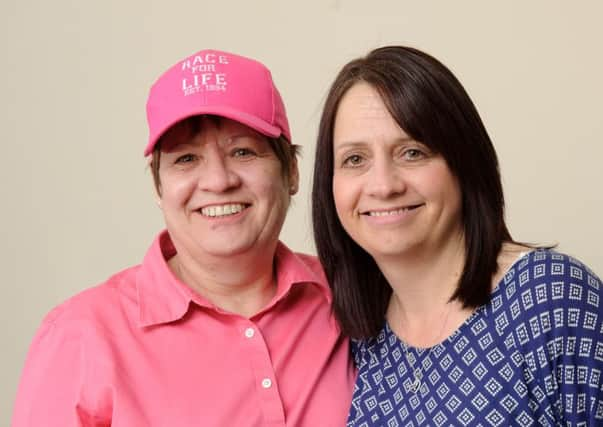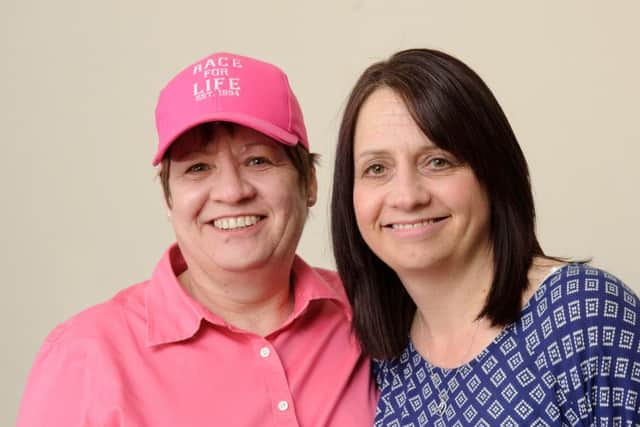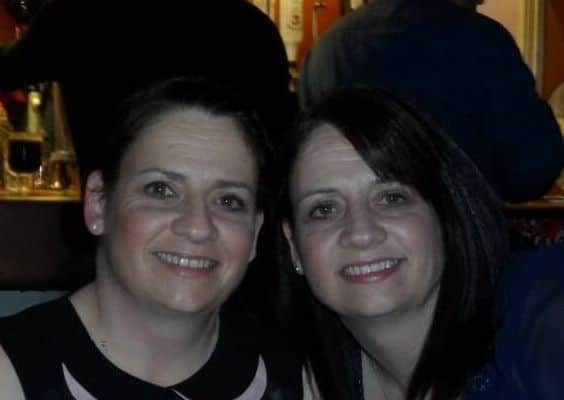'˜When my twin sister died, I felt as if I had lost my shadow'


And her outgoing personality drew them to her.
But just over three years ago, Jay’s life began to ebb away in front of her devastated loved ones.
She was diagnosed with a brain tumour and, despite surgery, Jay, of Ernest Road, Havant, died aged 43 in May last year.


Advertisement
Hide AdAdvertisement
Hide AdShe left behind her two daughters, Izzy, 14, and Bethany, 16.
Her family have raised thousands of pounds in her memory for the charity Brain Tumour Research in the hope that other families will not have to suffer as they have.
Jay’s twin sister, Clair Betteridge, says: ‘Although we had known for some time that this moment was coming, I was still extremely shocked when Jay died and, to start with, didn’t really cope at all.
‘I truly felt as if I had lost my shadow. It was as if someone had cut off my arm. I still dream about her a lot and have flashbacks of the times that we were teenagers doing silly things.


Advertisement
Hide AdAdvertisement
Hide Ad‘I talk to her all the time as if she is still here with me. Of course I miss her like mad, but I see her every day when I look in the mirror.’
Clair, who lived just a few doors away from Jay, accompanied her to her first doctor’s appointment in February 2013. She had begun suffering migraine-like headaches and dizziness.
Neuro tests were clear, but, a couple of weeks later Clair received a call from one of Jay’s daughters, asking for help because their mum couldn’t get out of the bath.
Clair says: ‘I immediately knew something was wrong, she seemed to be acting very strangely and we called an ambulance.


Advertisement
Hide AdAdvertisement
Hide Ad‘Initially it was thought she might have had a small bleed on the brain, but she was allowed home within a couple of hours.
‘Two weeks or so after that I came home one day to find her having a seizure on the sofa. This time the hospital told us she would have a brain scan and then a lumbar puncture and it was at that point we realised something was seriously wrong.
‘She didn’t need the lumbar puncture as the scan showed she had a grade 4 glioblastoma multiforme, the most common and aggressive form of brain tumour.
‘At first, Jay didn’t want to have the surgery which was needed to remove as much of the tumour as possible – although without the procedure her life expectancy could be as little as six months’.


Advertisement
Hide AdAdvertisement
Hide AdOlder sister Linda Howard, from Fareham, helped Jay see she had to do what she could – not just for herself, but for her children.
The tumour was successfully removed. As she came round she asked one of the nurses in recovery to let her family know she ‘wasn’t dead yet’.
Clair says: ‘We took this as a good sign, she was back to her old self. But despite such moments of humour, we all knew it was likely that the tumour would come back’.
She recovered well from the surgery with no lasting problems and underwent radiotherapy and chemotherapy.
Advertisement
Hide AdAdvertisement
Hide AdBut, sadly, it wasn’t long before her family noticed she was behaving oddly once more.
Clair says: ‘I don’t think she realised what was happening and she started having seizures again.
‘After that, Jay’s condition deteriorated rapidly. She had no strength in her legs and was soon unable to get out of bed’.
In early October, Jay went into the Rowans Hospice at Purbrook and then Cams Ridge Nursing Home in Fareham.
Advertisement
Hide AdAdvertisement
Hide AdLinda, a 52-year-old Detective Inspector in Hampshire Constabulary, says they cannot thank the staff enough.
She says: ‘They didn’t just look after Jay, they looked after our whole family’.
Bit by bit, the cancer chipped away at Jay.
‘It is an evil disease’, says Linda.
‘You actually lose the person before they die.’
The sisters, who have an older brother, Mark, 54. all spent time together before the end.
Clair says: ‘There was only one thing I could do and that was to be there for her and to do the best I could to stay positive.
Advertisement
Hide AdAdvertisement
Hide Ad‘I could feel her slipping away and, extraordinarily, as Jay’s heart rate dropped, my own was racing and causing pains in my chest.
‘It was as if I could feel the moment of her death coming.’
She adds: ‘Throughout our lives, Jay and I either saw each other or spoke on the phone almost every day.
‘This is the longest we have ever been apart and the only way I can bear this is to imagine she has emigrated to Australia and that I will hear from her soon.
‘Our grief is unpredictable and comes at us like a wave.
‘Some days you feel as if you are beginning to get back on your feet, while on others you feel it crashing down on you’.
To see a video with this story, go to portsmouth.co.uk.
RAISING FUNDS AND AWARENESS
Advertisement
Hide AdAdvertisement
Hide AdSisters Clair Betteridge and Linda Howard are campaigning with the charity Brain Tumour Research to raise awareness during March which is National Brain Tumour Awareness Month.
The sisters are taking part in Wear A Hat Day on Thursday, March 24.
People at schools and workplaces across the country will be wearing hats of all descriptions, organising hat-themed events, and making donations to the charity.
The charity funds a network of research Centres of Excellence including one at the University of Portsmouth.
Advertisement
Hide AdAdvertisement
Hide AdBrain tumours kill more children and adults under the age of 40 than any other cancer.
Yet just one per cent of the national spend on cancer research has been allocated to brain tumours.
Around 16,000 people each year are diagnosed with a brain tumour.
Less than 20 per cent of those survive beyond five years compared with an average of 50 per cent across all cancers.
Advertisement
Hide AdAdvertisement
Hide AdOne in 50 of all people who die under the age of 60, die from a brain tumour.
Seventy-one per cent of those who die of a brain tumour are under the age of 75 (compared to 47 per cent for all cancers).
Unlike most other cancers, incidences and deaths from brain tumours are increasing.
For more information go to braintumourresearch.org or call 01908 867200 for more information.
A donation of £5 can be made by texting the world HAT to 70660